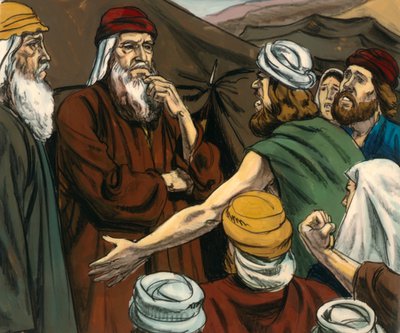Thoughts for the Day
Sunday, 4th August 2024: When times are difficult
Moses Blessings Trouble Exodus 16 Wilderness God
Reading : Verses from Exodus, Chapter 16

The whole congregation of the Israelites complained against Moses and Aaron in the wilderness. The Israelites said to them, ‘If only we had died by the hand of the Lord in the land of Egypt, when we sat by the fleshpots and ate our fill of bread; for you have brought us out into this wilderness to kill this whole assembly with hunger.’
Then the Lord said to Moses, ‘I am going to rain bread from heaven for you, and each day the people shall go out and gather enough for that day. In that way I will test them, whether they will follow my instruction or not.'
Then Moses said to Aaron, ‘Say to the whole congregation of the Israelites, “Draw near to the Lord, for he has heard your complaining.”’ And as Aaron spoke to the whole congregation of the Israelites, they looked towards the wilderness, and the glory of the Lord appeared in the cloud. The Lord spoke to Moses and said, ‘I have heard the complaining of the Israelites; say to them, “At twilight you shall eat meat, and in the morning you shall have your fill of bread; then you shall know I am the Lord your God.”’
In the evening quails came up and covered the camp; and in the morning there was a layer of dew around the camp. When the layer of dew lifted, there on the surface of the wilderness was a fine flaky substance, as fine as frost on the ground. When the Israelites saw it, they said to one another, ‘What is it?’ For they did not know what it was. Moses said to them, ‘It is the bread that the Lord has given you to eat.
(Lectionary, New Revised Standard Version)
Thoughts
If you've ever read the Book of Exodus to this point in Chapter 16, it will have left you with an indelible impression of the vagaries of the Hebrew people. They had become Pharoah's slave nation building his pyramids; then Moses appears to offer them hope; they endure the ten plagues; then flee to cross the Red Sea as the waters part before them; and finally watch as the sea returns to swallow up the Egyptian army. At last they are free of persecution, and celebrate their freedom with song and dance, declaring their loyalty to Moses and to God. But then three days later in the Wilderness of Shur with no food they rebel against Moses and against God, declaring it would have been better if they had died in Egypt.
Abel Ndjerareau in his 'Africa Bible Commentary' has this quote: 'The people of Chad say "One day of hunger can make a wife leave her husband's house."'
Suffering makes the people change! However, God is to answer their cries with compassion. He does not send them a banquet, merely enough food in the form of manna and quails for each day. They are to learn to trust God - that the food will continue each day - and to obey His instructions. Moses also places a portion of the food in the place of worship, so that they will remember God's blessings each day.
When times are tough for us, and when we are at our lowest ebb for whatever reason, we too need to hold on to the belief that God's blessings never end, and turn to Him, allowing Him to sort out our problems. Then may we respond with thanks and praise.
Prayer
Father-God,
we bring before You today
a multitude of concerns,
some of which only affect us,
and others that affect people
known only to You.
We ask You to give confidence
to those who need need help
that You are with all who suffer,
and that Your Will prevails, always.
Amen.
You might like to play this hymn, set to the tune for "Ode to Joy" by Beethoven, and sung by the Valdoster First Methodist Church Choir: